Love, According to Dave
Britt Aamodt offers an in-depth profile of emerging screenwriter turned playwright, David Ash -- the local writer/director of the underground film festival favorite, "Love: A Documentary," and a new play, "Connected."
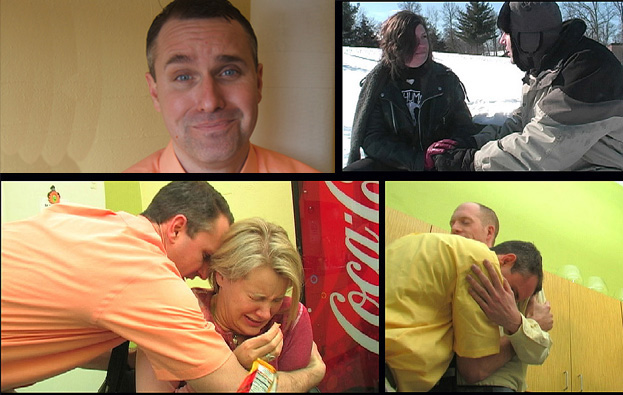
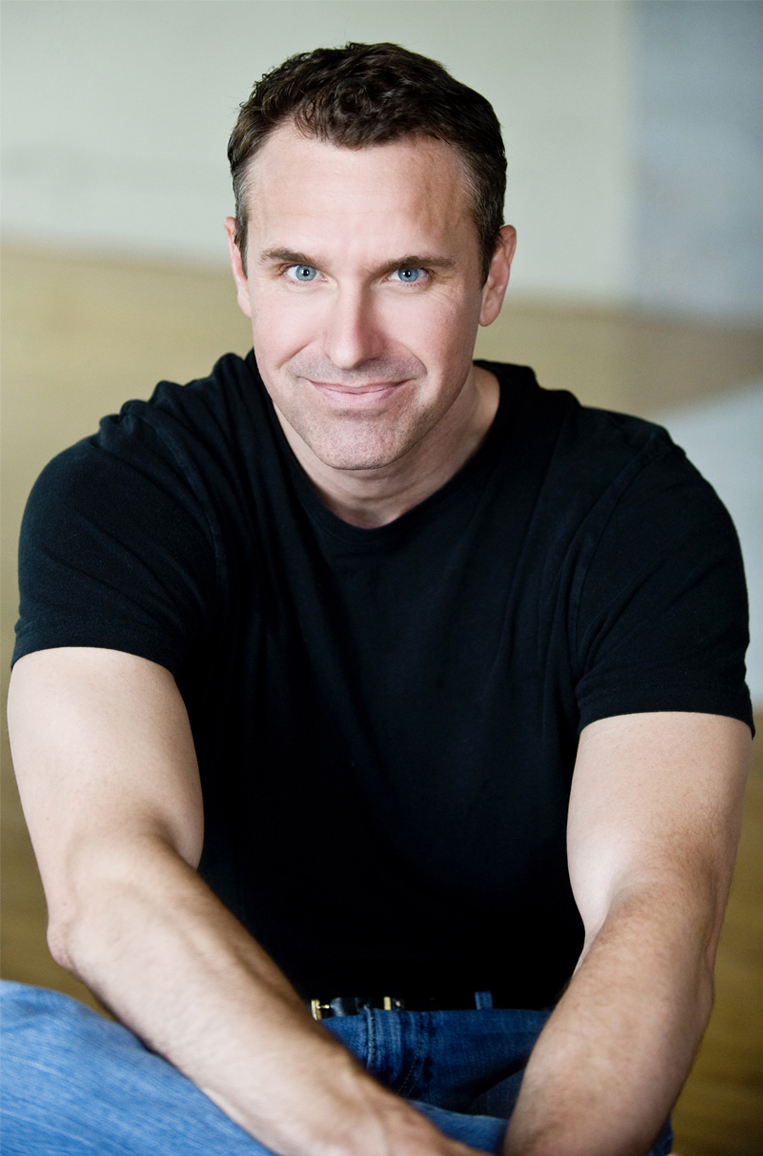
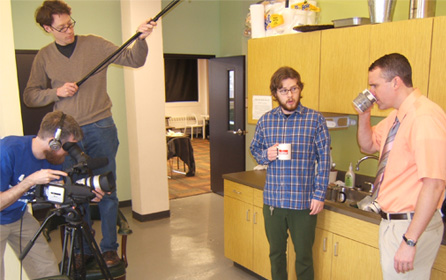
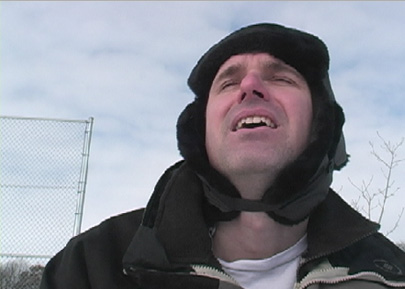
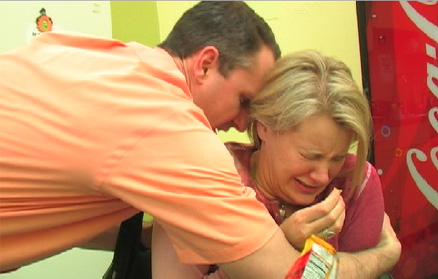
DAVID ASH WANTS YOU TO KNOW THAT LOVE, God, and the inscrutability of human connection are alive and well, right here in Minnesota, right now in the computer age, and ripe for some intensive filmic and theatric scrutiny. And, say, if anyone’s unsnarled the mystery of the aforesaid, please drop him a line at 355 Productions, his film production company, because Dave says he hasn’t got a clue about any of those mysteries-not yet.
Dave Ash is a Twin Cities screenwriter and playwright. In 2007, he wrote, produced, and starred in Love: A Documentary. The film is a mockumentary about a man chosen by God, or so he claims, to spread love around the world. But the world is a mighty big place, so John Stevens, a corporate do-gooder, decides to begin at the office, dispensing both hugs and words of love to his coworkers. Love screened locally at the Minneapolis Underground Film Festival and the Homegrown Cinema Series, and traveled the national festival circuit in 2008.
Then in 2009, Ash hung up the video camera, at least temporarily, and flipped on the stage lights. The film producer has turned to playwriting, although his questions remain the same. What is love? Does God exist? Can two hearts connect in a world where people increasingly run to the computer for intimacy? And, in the end, is love once found even worth the price it exacts? In Connected, Ash’s play, the writer introduces his audience to another John, John Cooper, who, like the protagonist in Love, seeks to understand his place in the scheme of things through the fulfillment of that most basic of needs-to find someone else to cling to, simple human companionship.
Regardless of the form in which he’s working, or the constraints of production budgets and shooting schedules, or the limits of writing for the stage, Ash challenges the viewer to consider the implications of the fundamental questions he poses. His are questions that dive to the heart of human identity and drives – are we, at the core, emotional beings, or merely biological organisms? Or, are we humans somehow divine, sparks of God temporarily caught in the mortal coil? It’s hard to say which, when you reach the end of an Ash script. And if you’re looking for consolation in this world of loose ends and mixed messages, turn off the DVD, exit the rear door, and scrap this article; because Ash won’t provide (and doesn’t even claim to have) a satisfying answer. He’ll just make you laugh at the agonizing incomprehensibility of it all — and, if you think about it, that’s a perfectly appropriate response, too.
LOVE LIVES IN IOWA
Dave Ash is a tall guy. He’s Abe Lincoln tall. The kind of guy that stands above the crowd and gets noticed, particularly when he’s sporting a bright yellow shirt and equally striking SpongeBob tie. Fortunately the sunny costume is just that — rags purchased for Ash’s role as John Stevens in Love: A Documentary. In real life, Ash favors a subdued palette, the blues and grays of a corporate citizen, which he is five days a week. From nine-to-five, Ash is treasury manager at Ecolab in St. Paul.
“Ecolab is the world’s largest supplier of sanitation products and cleaning supplies,” Ash rattles off, sitting down with his egg salad sandwich at Nina’s in St. Paul. He’s fresh from the office, making room for our interview about his writing between the end of his corporate workday and the commute home. For Dave, this is dinnertime. It’s also transition time, when he mentally shifts from the organized world of finance to the more expansive territories of creative writing. “Before Ecolab, I worked at H.P. Fuller for about eight years. They make glues and adhesives, and snore.” He pretends to nod off.
After you’ve spent eighty minutes watching Ash play wardrobe-challenged John Stevens in Love, it’s difficult to close the gap between writer and character. Are Ash and Stevens the same guy? I suppose you could ask a similar question about Woody Allen, who plays the same stock neurotic in every film he directs. Allen, like Ash, could write another sort of part for himself, but he doesn’t. You have to wonder why.
“I’m not trying to be confessional in my writing,” professes Ash. “But, yeah, I invent characters to say what I need to say and express how I’m feeling.” He stars as those characters, too, in Love and in a number of film shorts available on YouTube. The confusion between invention and reality is understandable: the man who works at Ecolab and the character who wears the garish yellow shirt look exactly alike. But unlike his character, Ash isn’t the type of guy to hold his coworkers hostage in the break room with a sermon on love. He clocks his time at the office and saves his rants for the printed page.
Ash grew up on Oelwein, Iowa. Never heard of it? Most of America hadn’t either, until Nick Reding published Methland: The Death and Life of an American Small Town in July 2009. The book documents the drug culture and economic decline of Ash’s hometown. Of Oelwein, Ash says, “It had a couple bars and churches, about a thousand people. It was a good place to be from.” He grew up in the Oelwein of the 1970s and ’80s, before the meth craze hit rural America. Still, there wasn’t much to occupy the teen population. “I was mostly into drinking and gambling, some school here and there. Sports. Stuff you do when you’re a teen,” he says.
Writing didn’t figure in until college. Ash, a business major, wrote a column for the University of Kentucky student paper, the Kentucky Kernel. “The column was literally what was pissing me off that week. I started off political, but then that devolved — or evolved — into a sarcastic, jaded voice,” he says. “I like getting under people’s skins. I like that point in between emotions, between funny and horrible. I found that voice with my college writing.”
______________________________________________________
“All this ridiculous stuff going on in my life, painful stuff, and that’s a wonderful source for comedy. I like getting under people’s skins — capturing that point in between emotions, somewhere between funny and horrible.”
______________________________________________________
Ash went on to graduate school, and then into a career in finance. No big surprise there. But that sarcastic, jaded voice he’d discovered in college remained, and it wanted to vent.
LOVE GOES HOLLYWOOD
In 2003, Ash took a screenwriting class at the Loft Literary Center, which in turn led him to IFP, where he produced his first short film, “Who Killed Tony?” with the assistance of producer-mentor Chris Mick and the acting talents of fellow classmates. “Tony” was also Ash’s first shot at acting: in this short he played a straight-edged office slave who fells his boss with a No. 2 pencil. And Ash got lucky right off the bat: this debut
Ash also wrote a feature-length screenplay that landed him at a screenwriting expo in Hollywood. “I went to one of those pitch sessions thinking, This is going to be great. I’m going to sell screenplays and that’s what I’m going to do with my life.” He approached a big-name producer and pitched his script. She stopped him before he’d even started. “No, no,” she said. “What’s the shot?”
Ash explains: “She wanted my elevator pitch. And I thought, I can’t do this. I wasn’t prepared. So, I said, ‘It’s a lot like River Dance meets The Passion of Christ.’ She didn’t laugh.”
From that experience, Ash realized that, 1) Hollywood wasn’t looking for his kind of script, and 2) that if he was going to see his films made, he’d have to make them himself. Fortunately, he had the right kind of day job to foot production costs.
LOVE TAKES THE DIRECTOR’S CHAIR
Love: A Documentary grew out of Ash’s frustrations with the Hollywood script mill and his desire to write something more substantial than the short film format would allow. “I was going through a divorce when I wrote Love, and I had a lot I wanted to talk about, without making John a proxy for me,” he says. “All this ridiculous stuff going on in my life, painful stuff, and that’s a wonderful source for comedy.”
Ash doesn’t talk about divorce in Love; he approaches his subject obliquely. Here’s the film’s set-up: the protagonist, John Stevens, is an office worker being interviewed for a promotional documentary made about his company, Cratech Industries; “footage” from these interviews comprise the bulk of the material for film. Love is a mockumentary, a narrative film dressed as a documentary. The fictional camera crew follows Stevens over the course of several weeks, capturing his attempts to proselytize colleagues, boss, and family with his message of love. For the viewer, it is clear from the outset Stevens’s efforts are fruitless; it’s funny, but also jarring and uncomfortable, even pathetic, to watch.
“I’ve stood at the back of auditoriums when Love is playing,” says Ash, “and people in the audience are either laughing their asses off or squirming.”
That’s because Ash plays his protagonist straight-faced, as a sincere missionary whose good intentions are met with open hostility — because coworkers don’t want hugs. They don’t want touchy-feely chats at the coffee pot. Today’s office workers really just want to earn a paycheck and go home.
LOVE HITS THE BOARDS
Ash’s next project, Connected, was first conceived and written as a screenplay. He never intended to try his hand at playwriting until Bethany Ford, a member of The Cromulent Shakespeare Company, asked him to submit something for the company’s Mid-Winter Repertory. So, Ash adapted the story for the theater, and Cromulent staged a reading of Connected at the Minneapolis Theatre Garage in February.
“The storyline of Connected is something I’ve always been fascinated by: to what extent are love and God real, and to what extent are they self-perpetuating fantasies?” explains Ash; he says the play’s premise was sparked by an interview he’d read with Microsoft founder Bill Gates. “Gates was saying that in a few years they’d be able to replicate the human brain with computer software — not just as a possibility, but as a reality. Basically, your brain is a meat computer.”
In the narrative of Connected, John Cooper, a computer programmer, has been tasked to create software that will duplicate the workings of the human brain. The metaphysical and psychological implications of the endeavor throw Cooper into despair. He seeks counseling. “Some days I feel almost okay and then out of nowhere I just, like, fall off this cliff and into this pit of fear and despair and I feel so terrified and desperate I don’t know how I can go on,” the protagonist confides to his therapist, who offers a sage nod before reaching for a ringing cell phone.
Connected is about being disconnected — from yourself, from others, and from a world that’s moving too fast to care where it’s going or how it’s getting there. Cooper seeks to assuage his loneliness in romance. He meets Emily through an Internet dating site. They meet, fall in love (or Cooper does, at least), and then proceed to fumble through a simulation of a relationship that flips as hot and cold as the binary language of computers.
While the narrative line of the play ostensibly centers on romantic missteps, Connected is equally concerned with existential alienation, a feeling of being disconnected from God. In the play, Cooper turns from Emily to God to fill the hole in his life, but, even then, he can’t still the nagging, overarching uncertainty that’s plaguing him: If the human mind can be replicated, then why not God? And who’s to say either is real?
(Watch a scene from the staged reading last year below.)
After the staged reading of Connected, Ash fielded questions from the audience. “The audience feedback ran for over an hour, so we had to cut it off,” he remembers. “Not all of it was positive, but the audience was engaged — they wanted to know what the play was about. For me, I want to get a point across without saying, ‘This is it.’ I want it to be somewhere in between emotions so the audience has to search for it.”
Asked what he’s trying to convey with his work, Ash summarizes the best he can. “The stories I like best are those in which the guy doesn’t get the girl, because that’s what I need to feel okay about. I don’t need to feel okay about getting the girl; I can handle that. It’s about human connection in general, the mystery of it.”
He hopes, too, that when you watch his characters struggle onstage and onscreen, “you feel less alone. Because that’s the overall message: we all struggle.”
Local theater companies have shown interest in producing Connected. Ash is also considering a film adaptation of his play.
*****
About the author: Britt Aamodt‘s book on Minnesota’s contemporary cartoonists (Off Color) is coming out fall 2010 from the Minnesota Historical Society Press. Britt reports on the arts for KFAI radio in Minneapolis, and is the founder of the radio play group Deadbeats On The Air.